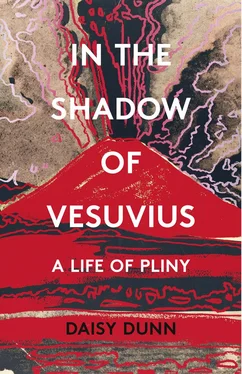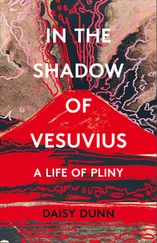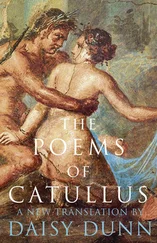Josephus presented suicide as a crime against nature and impiety against God: since the soul is immortal and part of the divinity, and life a gift from God, then it ought to be God’s decision as to when to take it away. His description of Jewish suicides entering the darkness might well have reminded Romans of the souls of suicides wandering Hades in Virgil’s Aeneid. Josephus failed to shake the Jews of their resolve. He therefore suggested that they take lots to kill one another so as to avoid dying by their own hands. Lots were duly taken, but when Josephus emerged as one of the last two to have to die, he ensured he did not have to by surrendering to the Romans. As if in possession of a divine prophecy, he addressed Vespasian as though he were already emperor, allegedly thereby sowing the seed of his ambition.
Around a year later, in AD 68, came news that Nero had died. Years of cruelty and overspending had left him isolated. Abandoned by his guard, he was recalled to Rome only to be declared an enemy of the state by the senate. He avoided brutal execution by taking a dagger to his own throat. Nero’s death without issue left a power vacuum into which men poured like lava. AD 69 went down in history as the ‘Year of the Four Emperors’ and ‘almost the last year of the state’, as civil war broke out over the succession. 8First to succeed Nero was Galba, governor of Hispania Tarraconensis, the easternmost of Rome’s provinces in Spain. The Praetorian Guard assassinated him after seven months and installed his deputy, Otho, in his place. Otho ruled for three months. The Roman legions replaced him with their commander Vitellius. Finally, Vespasian was hailed emperor by his troops. He was fortunate enough to have the support of the governors of Egypt and Syria and the benefit of a strong army, who defeated Vitellius’ men at Cremona in northern Italy. As Vespasian assumed power with the blessing of the senate at Rome, his son Titus set about completing the conquest of Judaea.
Pliny the Elder had come to know Titus well as a young man. Born in about AD 39 to Vespasian and his wife in a ‘pokey dark bedroom’ in a ‘squalid’ seven-storeyed building in Rome, he had grown up at the imperial court with Claudius’ son Britannicus in a rare conferral of honour. 9Although the young Titus was said to have been rather too keen on eunuchs and parties, he soon redeemed himself through his military prowess. 10Having impressed everyone around him with his ‘receptiveness to learning almost all the arts of war and peace’ and skill in arms and horsemanship, he left for Germania, which was where he met Pliny the Elder. 11
Following his campaign against the tribe of the Chatti, Pliny the Elder had returned to the region once more with the Roman army. In the course of his travels he came to Vetera, modern Xanten, near the Rhine, the very camp where Drusus had established his headquarters in 11 BC. Remarkably, some horse trappings bearing Pliny the Elder’s name and post were discovered at the site in the nineteenth century. Made of brass overlaid in silver, the adornments are exquisitely detailed. Several roundels, four of which feature portrait heads, are connected by chains which would have fitted to the harness of the horse. The roundel inscribed with Pliny the Elder’s name has at its centre a portrait of a wide-eyed man with a fringe. Was this a stylised portrait of Pliny the Elder? Could the roundel have hung from his horse? It is very tempting to picture the trapping flapping around Pliny the Elder’s shins as he stormed through the thick German forests. While it is possible that the portrait does indeed show Pliny the Elder, it is more likely to depict Emperor Claudius or the young Nero. 12Inscribed with the names of two further men besides, the trappings might well have belonged to Pliny the Elder before being passed down to officers stationed under his command. 13Whether the object passed through Pliny the Elder’s hands or not, it is a tantalising relic of the authority he had attained in the Roman cavalry at the time he met the young Titus.
When Pliny the Elder came to write his encyclopaedia, he reflected fondly on Titus as his former contubernalis , or ‘ tent-mate’. It is a pity that he did not describe in his Natural History the kind of life they shared in Germania. The period was evidently instructive for them both, and Titus would not forget Pliny the Elder when he became emperor two decades later. In the short term, his experience in a German camp must have been valuable preparation for the military career that he pursued under his father in the Jewish War. Once Vespasian had embarked upon his duties as emperor, Titus was entrusted with leading the legions to besiege Jerusalem, where fighting had broken out between rival groups of Zealots. As a struggle ensued between the Jews and Roman forces in AD 70, the Temple of Jerusalem was set alight. Treasures salvaged from the flames were carried to Rome and paraded the following year when Titus and Vespasian celebrated a joint triumph for their efforts. By the time the Jewish War ended with the siege of Masada in AD 73–4, hundreds of thousands of Jews, maybe more, had lost their lives. Josephus, the Jew who had predicted Vespasian’s rise, enjoyed the rare privilege of living out the rest of his life in Rome as a Roman citizen.
Pliny the Elder did not describe the atrocities of the Jewish War in his encyclopaedia. The closest he came to acknowledging the destruction the Romans wreaked was when he referred to the former town of Engadda as ‘second to Jerusalem in fertility and palm groves, now another funeral pyre’. 14Masada was merely ‘a fortress on a rock’. Judaea was evoked to provide context for descriptions of the discovery or trade of plants such as its native balsam. 15Pliny the Elder did however experience Vespasian’s rule from close quarters. The death of Nero and return of relative stability to Rome after the catastrophic Year of the Four Emperors enabled him to emerge from his quietude and earn a place on the imperial council. Every morning in the city, clientes (‘clients’) paid a formal greeting or salutatio to their patrons in the halls of their homes. Pliny the Elder, who made a habit of rising soon after midnight in the autumn and winter months, was among those who attended the emperor. An ‘early riser’ himself, Vespasian received his greeting before he had so much as put on his shoes. 16Once the meeting was adjourned and he had dealt with any necessary business, Vespasian would return to bed, usually with one of his concubines (he was already a widower when he came to power).
Having re-established control over Judaea, Vespasian was determined to put the empire back on an even keel. Increasing – and in some cases doubling – the tribute which the provinces owed Rome, he earned a reputation for cupidity, but went some way towards recovering the financial losses Rome had suffered through Nero’s profligacy. 17Pliny the Elder played an increasingly important role in his administration. In the seventies AD, he was appointed to a series of civil posts or ‘procuratorships’ overseas. Although the details of his employments are unknown, he is said to have ‘conducted very splendid and continuous procuratorships with the utmost integrity’, one of which took him to Tarraconensis, the largest Roman province in Hispania, to oversee the imperial finances. 18
Between his work for the imperial council and his promotion following his procuratorships to the admiralty of the fleet, Pliny the Elder had little time for conducting his own research. He had no more opportunity to pursue his own interests when, in AD 79, Vespasian died at the age of sixty-nine, anticipating his posthumous deification with the words: ‘I think I’m becoming a god.’ 19His successor, Titus, was only too pleased to retain his former tent-mate in the imperial administration. Pliny the Elder had little choice but to persevere with his studies in the rare hours he had to himself. As he explained to the new emperor, he dedicated his days to him, and his nights to producing his encyclopaedia. 20
Читать дальше












